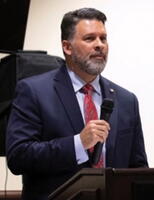
In 2017, the ICMA Assistant Manager Task Force began its term of service at the annual conference in San Antonio. During its service year, the task force took steps to design a toolkit framework for deputy and assistant managers and recommended that ICMA constitute a new standing advisory board for those managers to advise ICMA staff on various professional development and outreach activities.
The ICMA Advisory Board for Deputies and Assistants formed in 2019 at the annual conference in Nashville and recently submitted to ICMA a final draft of the toolkit for consideration and completion. The advisory board supports the premise that the role of deputies and assistants is critical to advancing professional administration and management of communities. Members recommended having a session during the 2020 UNITE conference that touched on becoming a deputy or assistant and how to support one. The presentation sought to explain and share resources that ICMA has created to develop and sustain assistants. Throughout the presentation, we referred to “assistants” as a catch-all title that includes deputy, assistant, and assistant-to positions for both city and county organizations.
Of course, not every organization has an assistant position, and the role is unique in those that do. Still, there are some ways to prepare for and to occupy the position effectively, regardless of whether one aspires to a chief manager role. Although we could not touch on all ideas related to this topic, we addressed several key aspects.
Assistants have varied roles.
Factors including, but not limited to, background or expertise, compatibility, interest (portfolio development), education, organizational need, single versus multiple peers, and title or hierarchy differences affect the placement and expectations of assistants.
Assistants have wide-ranging experience.
Just as the responsibilities vary for assistants, so do the paths to these roles. This diversity of experience is valuable, as managing and sustaining communities requires diverse perspectives and expertise. No specific required track leads one to success as an assistant; however, developing and benefiting from a skillset across ICMA’s 14 core competencies through direct assignments or other training and education is beneficial. These practices for effective local government leaders are a fantastic guide for anyone in the profession.
The assistant role has common themes.
Despite differences in assistants’ paths, roles, and organizations, there are also similarities. At least six essential skills support effective role execution across the assistant position—adaptability, creativity, deliberateness, flexibility, juggling, and resilience. Essentially, assistants wear many hats and must be forward-thinking, solution-oriented, and able to go with the flow and be prepared to do so. Assistants must have the ability to work between the chief manager and department directors while functioning between policy and operations. To that end, taking steps to care for personal wellness, especially during a pandemic, also requires the ability to perform a balancing act.
Assistants benefit from continuous professional development and volunteerism.
In addition to academic training and on-the-job experiential training, assistants and those considering the role can benefit from tapping into ICMA’s professional development, coaching, and mentoring opportunities and those of their local government affiliate groups and other leading organizations. Another great way to prepare and succeed long-term as an assistant is by volunteering on an ICMA or state affiliate board, committee, or task force. Volunteering in this way does require a time commitment, which will vary based on assignment, but assistants do the “and-then-some.” Engaging as a professional volunteer allows for knowledge increase, honing skills, and implementing skill sets not necessarily applied in a current position while developing relationships and networking within your professional community.
Volunteering on a board, committee, or task force is a great way to network and share your expertise while building skills, gaining pertinent information, and making a valuable contribution to the profession. The committees and task forces cover a broad cross-section of issues important to ICMA and local governments in general, so be sure to watch for the Call for Volunteers this spring.
We are excited to celebrate and learn from the successes of all assistants and how we all can, in turn, share our knowledge and stories with counterparts across ICMA. In the coming year, we look forward to our board members sharing content to help us all learn about the diversity of roles and experiences of deputies and assistants across our different and great communities.
Advisory Board
The work of the Advisory Board for Deputies and Assistants is meant to firmly establish paths for current and aspiring assistants within ICMA. Work will focus on content and building professional development through skill-based training and experiences. The members of the advisory board are interested in hearing your ideas for future content in PM magazine, through webinars, and the regional or annual conferences.
 Marty Hughes | Assistant City Manager | Kennesaw, Georgia
Marty Hughes | Assistant City Manager | Kennesaw, Georgia

My name is Marty Hughes, and I’m learning a new language. For 30 years, I served in the U.S. Air Force, and since March 2019, I have been the assistant city manager of Kennesaw, Georgia. Many people ask me, “How do you go from working at the federal government level to the local government level.” My analogy involves the use of language. For 30 years, I spoke Spanish. Now, I am learning to speak Italian. With both languages being Latin-based, there are plenty of key words to understand things, and as each day passes, my Italian gets better.
Before I get too far ahead, let me back up a little. As my military career was winding down, I started to ask myself, “What next?” Did I want a federal civilian job? What about the private sector? I based my decision to join the Air Force on serving my country and wanting a meaningful job. These beliefs did not change as I thought about my “second career.”
Over the course of my Air Force career, I had the honor of having numerous mentors who guided me through challenges. Their leadership allowed me to deal with many types of people and situations. In many ways, the skills of a military member are adaptable to the “civilian world.” For my next career, my mentors were retired military members, as well as business and community leaders. Obtaining advice on job opportunities and expanding my professional connections were critical to finding both personal and professional satisfaction.
When I spoke with the city manager and mayor of Kennesaw, I appreciated their desire to hire veterans, and we have been a team since day one. They readily understood the many positive attributes I bring to local government. For example, my leadership, critical thinking, time management, organizational skills, and effective communication. Working at the local government level is where the “rubber meets the road” in our form of a representative republic.
With my new position as assistant city manager, I appreciate the fact that I can make a positive impact in my community and in my profession, just as I did for my country. I actively mentor and support those still serving in the military, as well as civilians in the greater Atlanta area. I also have the great honor to serve on the Chattahoochee Technical College Foundation Board of Directors. Education is important, whether it’s on-the-job training or higher education at a technical college or university. Additionally, ICMA is full of opportunities. I serve on the Assistants/Deputies Advisory and the Veterans Advisory Boards.
To come full circle, my beliefs still haven’t changed. Having served in the military and now working in local government, I am proud to serve my community in a meaningful job.


Monica Spells and Dan Weinheimer served on the 2017 ICMA Assistant Manager Task Force and currently serve as co-chairs for the 2019–2021 ICMA Advisory Board for Deputies and Assistants, which is comprised of talented local government professionals across ICMA’s membership.
New, Reduced Membership Dues
A new, reduced dues rate is available for CAOs/ACAOs, along with additional discounts for those in smaller communities, has been implemented. Learn more and be sure to join or renew today!
